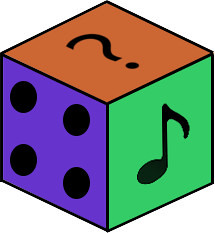
- Accompanist (role)
- Ad libitum
- Agenda
- Aleatoricism
- Aspect
- Balance
- Bartle types
- BCG
- (Cognitive) flow
- Conductor (role)
- Constellation
- Constructor (role)
- Co-optionality
- Cue cards
- Dice
- Dimension
- Downbeat
- Downtime
- Elegant Game
- Emergence
- End Condition
- Event (musical event)
- Extended technique
- Facilitator
- Fighting
- Flow
- Found sound
- Gameplay flow
- Genre
- Heteronomous Music
- Horizon of intent
- Improvisation rite
- Insert game
- Inspire cards
- Instrument Preparation
- Judge (role)
- Karaoke
- King-making
- Learning curve
- Ludomusical dissonance
- Meaningful Choice
- Mechanic
- Music game
- Non-idiomatic music
- Notation Cards
- Open work
- Parameter
- Pervasive Game
- Player (role)
- Prompter (role)
- Psychographics
- Quarterbacking
- Rhythm cards
- Rhythm game
- Roles
- RPG
- Rule Cards
- Speedrun
- Stacking
- Trading
- Transition
- Upgrade
- Victory condition
- Xenochrony
- XP
- Yes, and...
The genre of "no genre" — free music.
Usage
There are a few names for a similar (or the same) activity which stress different aspects and opportunities of this music.
- non-idiomatic music — focusing on the active avoidance of convention, an approach preferred e.g. by Derek Bailey,
- free improvisation, with the second name sometimes shortened to "improv", like in
- British free improv, which stresses some strong geographical influences, G.B. in this case, contrary to
- intuitive music, used after [*Karlheinz Stockhausen] who introduced some more mystical ideas at the start, and finally
- improvised experimental music, IEM, coined by Stephen Chase for the dissertation (2006) — a handy abbreviation!
The distinctions above might have a use when speaking historically, but currently with years of evolution and cross-inspiration, there might not be much point anymore in separating this family.
Rationale
Limitations imposed by genres might be welcome by artists by their decision or might be carried over unconsciously. Genres happen because of the natural human drive to categorize and are intertwined with "musical paradigms". When musicians see genre as a limiting set of conventions they might try to avoid it, but here comes our "non-idiomatic music" as yet another umbrella term. So there seems to be no easy escape from tags…
Music games were invented in similar circles where non-idiomatic music developed and were influenced by many of the same historical figures. Relation between genres and music games are complex (see: genre), but many games tend towards free playing.
All activities with free improvisation:
- 15 Cards
- #1722 Your Commuting Sounds
- AWEP172 Exploration/Creation
- AWZK170
- CCDCR132 (Daisy Chain Rite)
- CCSBR7 (Stupid Book Rite)
- Cellular Constellation
- CFIRT146
- CFS32
- CH27
- CHMR89 (Military Rite)
- CJ81
- CMH-CR135
- Conversations
- Dice Contract
- Diced Events
- Entitled Piece
- Even Divide
- Evolution of music
- Exotic Constellations
- Fairy Tale
- Fluxfestkit Legacy
- Game Over
- HMSCR104 (Commentary Rite)
- Houdini Exercise
- Include: Emoji Tags
- Into the Labyrinth
- Into The Labyrinth, lvl 1
- Loop Cycle
- Magic Music
- Mating Game
- Mood Guessing
- Movement for Ears
- MPNR21 (Night Rite)
- MPR109
- One Round Together
- PDIR3
- Personal Postcards
- P-S-Rock
- Room Score
- Rotary Jam
- RSIRNT101
- Running Cues
- Sea-game game
- Shuffled Cues
- Stay In Character
- Textmusic 3
- Textures
- The Audition
- The Birth of Music
- The Freemasons
- The Tear and Fold
- This Instrument is Not What it Seems
- Tonic (Card Set)
- Travel Routes
- Volume Waves
- Walking Score
- Who Started It?
Video
If you think anything should be added to this subpage, please drop a hint or a link for future editors.
